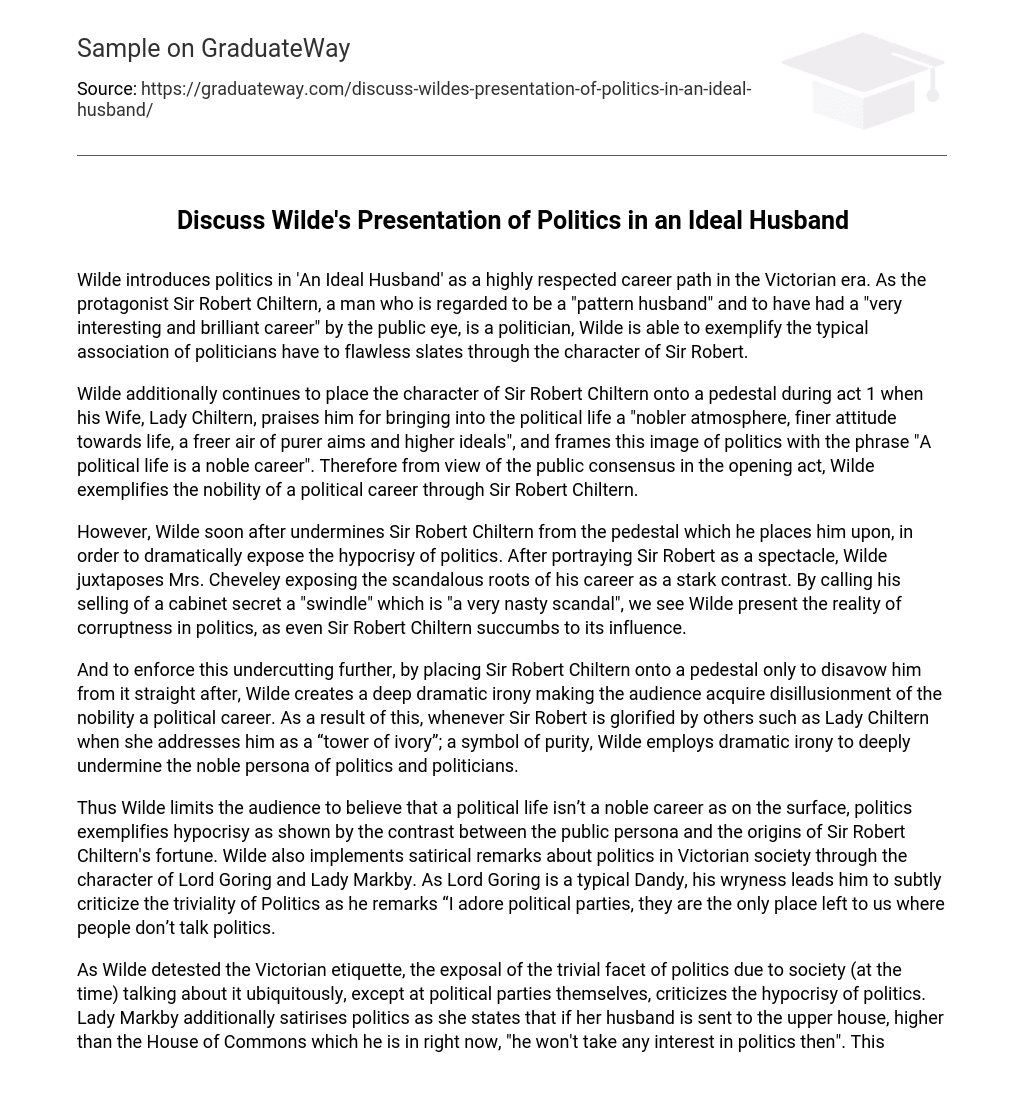Wilde introduces politics in ‘An Ideal Husband’ as a highly respected career path in the Victorian era. As the protagonist Sir Robert Chiltern, a man who is regarded to be a “pattern husband” and to have had a “very interesting and brilliant career” by the public eye, is a politician, Wilde is able to exemplify the typical association of politicians have to flawless slates through the character of Sir Robert.
Wilde additionally continues to place the character of Sir Robert Chiltern onto a pedestal during act 1 when his Wife, Lady Chiltern, praises him for bringing into the political life a “nobler atmosphere, finer attitude towards life, a freer air of purer aims and higher ideals”, and frames this image of politics with the phrase “A political life is a noble career”. Therefore from view of the public consensus in the opening act, Wilde exemplifies the nobility of a political career through Sir Robert Chiltern.
However, Wilde soon after undermines Sir Robert Chiltern from the pedestal which he places him upon, in order to dramatically expose the hypocrisy of politics. After portraying Sir Robert as a spectacle, Wilde juxtaposes Mrs. Cheveley exposing the scandalous roots of his career as a stark contrast. By calling his selling of a cabinet secret a “swindle” which is “a very nasty scandal”, we see Wilde present the reality of corruptness in politics, as even Sir Robert Chiltern succumbs to its influence.
And to enforce this undercutting further, by placing Sir Robert Chiltern onto a pedestal only to disavow him from it straight after, Wilde creates a deep dramatic irony making the audience acquire disillusionment of the nobility a political career. As a result of this, whenever Sir Robert is glorified by others such as Lady Chiltern when she addresses him as a “tower of ivory”; a symbol of purity, Wilde employs dramatic irony to deeply undermine the noble persona of politics and politicians.
Thus Wilde limits the audience to believe that a political life isn’t a noble career as on the surface, politics exemplifies hypocrisy as shown by the contrast between the public persona and the origins of Sir Robert Chiltern’s fortune. Wilde also implements satirical remarks about politics in Victorian society through the character of Lord Goring and Lady Markby. As Lord Goring is a typical Dandy, his wryness leads him to subtly criticize the triviality of Politics as he remarks “I adore political parties, they are the only place left to us where people don’t talk politics.
As Wilde detested the Victorian etiquette, the exposal of the trivial facet of politics due to society (at the time) talking about it ubiquitously, except at political parties themselves, criticizes the hypocrisy of politics. Lady Markby additionally satirises politics as she states that if her husband is sent to the upper house, higher than the House of Commons which he is in right now, “he won’t take any interest in politics then”. This therefore undermines the esteem of a political life, as Wilde presents a trivial and superficial nuance to politics.
Additionally, during the consolation of Sir Robert Chiltern by Lord Goring, Wilde diminishes the nobility of a political life. An epigrammatic phrase epitomizing this is when Lord Goring states that “…in England a man who can’t talk morality twice a week to a […] immoral audience is quite over as a serious politician”. This condemns the hypocrisy of Victorian society as it accuses politicians as being preachers, who make society conform to morality, portraying political life pessimistically.
Furthermore, as Sir Robert’s motives for power in his youth led him to hedonistic and immoral actions, Lord Goring undermines Sir Robert’s desire for power and a “gospel of gold” as a “shallow creed”. This reflects poorly on Sir Robert as Wilde stains his spotless slate as a politician, limiting the audiences’ view on the nobility of politics as the token politician in the play is corruptible. Wilde juxtaposes two extremes when exploring the limits of nobility of a political life.
Wilde layers his criticism of politics with a heavy use of dramatic irony to undermine all that appears to be pure, with serious melodrama exposing the hypocrisy behind politicians such as Sir Robert Chiltern, since he became ideal through less ideal means. However, by initially raising the respectability of a political career then proceeding to ridicule it, Wilde satirically emphasizes the superficial and hypocritical nature of politics limiting the audience’s view of its nobility.





